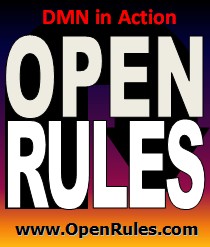Open Your Business Rules!
Rules-based
Operational Decision Services
Release Notes 6.2.1 (June-2012)
OpenRules® Release 6.2.1 adds new features, new sample projects, and enhanced user's documentation. Major improvements have been made in the following areas:
Database Integration
-
Accessing data located in
We provided additional classes (such as DatabaseIterator) to the standard package "com.openrules.tools" that simplify a database access. There are two new sample projects "HelloCustomerDB" and "DecisionPatientTherapyDB" that demonstrate how to get different data records (customers, patients) from a database and process them through OpenRulesEngine or Decision. See a new tutorial "DecisionPatientTherapyDB".
Creating and maintaining rules in
relational databases.
We extended OpenRulesEngine API to allow a user
programmatically to setup all database properties
without necessity to define Excel or any other
configuration files. This feature
is especially important when
a user wants to use OpenRules® within its
db-centric environment as an extension of SQL. In
particular, deploying decision services in OJVM (Java
Virtual Machine in the Oracle Database) requires that
all of their
resources be available via the Java classpath.
The standard OpenRules installation now includes
Decision as a Web Service
We created a new document "OpenRules
Web Services" that describes in detail how to
deploy an OpenRules project as a web service.
The standard installation now includes
New Decision Table Operators
Based on customer requests we added several new operators to
the decision tables:
- Compound assignment operators such as "+=" (assign plus),
"+=" (assign minus), "*=" (assign multiply), and "/="
(assign divide). These operators allow rules to modify
existing values of decision variables using decision table
conclusions. For example, a conclusion for the variable
"Score" may have an operator "+=" with a value "2.5".
If this rule is satisfied, the Score will be increased by
2.5.
- Along with conditional
operator "Include", that checks if an array includes all
values from another array, now you can use an operator "Does
Not Include".
Finding Multiple and Optimal Solutions
The enhanced Rule Solver now supports all three problem resolution modes:
- Find one solution
- Find all solutions
- Find optimal solution.
You may check out enhanced and new samples in DecisionXYZ and DecisionEmployeeScheduling.
We have enhanced the product's documentation. The User Manual is more compact now: we moved such topics as External Rules and Database Integration to separate manuals. A new manual for Web Decision Services has been added.
As always, the new release remains backward compatible. You may download the latest OpenRules® release 6.2.1 from www.openrules.com/download.htm. After the download, you need to update the folder "openrules.config". If you already have a previous installation you need to do the following:
- delete all openrules.config/*.xls files and replace them with new xls-files
- replace openrules.config/lib/openrules.all.jar with a new one.
Please post your comments and suggestions to the Google Discussion Group or send them to support@openrules.com.

